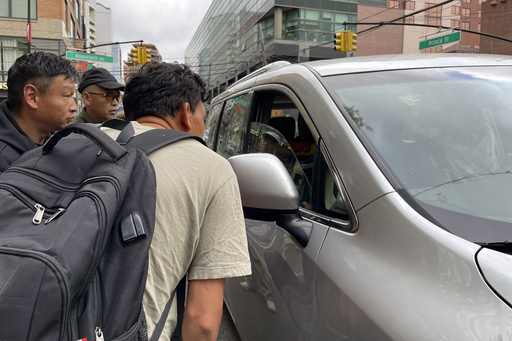
“`html
WASHINGTON — A recent survey indicates that adults from Asian American, Native Hawaiian, and Pacific Islander (AAPI) communities are more inclined than the general U.S. population to see legal immigration as beneficial to the nation’s economy and workforce.
While their perspective on legal immigration is favorable, their opinions on the threats posed by illegal immigration align closely with those of the broader American populace.
According to a survey released on Monday by AAPI Data in collaboration with a research center, approximately 80% of AAPI adults perceive legal immigration as a significant contributor to economic growth. In contrast, only about 40% of the general American population shares this sentiment, as seen in a related poll conducted in March. Moreover, around three-quarters of AAPI voters recognize skilled expertise in fields like science and technology as a major advantage of legal immigration, whereas only about 40% of Americans felt the same way last March.
These findings emerge amidst former President Donald Trump’s immigration-focused campaign against Vice President Kamala Harris, with the election fast approaching. Trump has recently made unfounded statements suggesting that the Federal Emergency Management Agency had depleted its resources assisting survivors of Hurricane Helene due to funding allocations for undocumented immigrants. During a recent debate, he also perpetuated a fabricated narrative alleging that Haitian immigrants in Springfield, Ohio, were harming pets, a myth that sparked bomb threats against educational institutions and government facilities and reflects historical prejudices against immigrant groups.
Aldrin Villahermosa II, a 25-year-old independent voter from Tacoma, Washington, expressed his frustration upon hearing Trump’s remarks targeting Haitians.
“Immigrants have always faced scrutiny over their unique culinary choices, but now they’re being attacked in relation to domesticated animals, which adds a disturbing twist to the ongoing discourse,” Villahermosa remarked.
He disagrees with the common assertion that undocumented immigrants do not positively contribute to society or the job market. He mentioned that a close friend from college is an undocumented teacher who plays a vital role in shaping future generations, despite the challenges that come with such a low-paying profession.
However, opinions on illegal immigration diverge significantly among AAPI adults. Only about 40% believe that undocumented immigrants contribute to economic growth, mirroring the general adult population’s viewpoint. Similarly, roughly one-third of AAPI adults recognize that those who are in the U.S. without legal status provide necessary expertise, aligning with the overall perceptions of Americans.
Near half of AAPI adults feel that enhancing security at the U.S.-Mexico border should be a high priority, with a similar percentage advocating for a reduction in wait times for green card applications. “The results suggest that AAPI individuals seek comprehensive solutions addressing both border control and the legal immigration process,” noted Karthick Ramakrishnan, the founder of AAPI Data.
Many members of the Asian American community, particularly those from Chinese, East Indian, and Filipino backgrounds, are deeply invested in the immigration system due to the prolonged durations they often encounter when attempting to sponsor a family member or secure worker visas.
Guann Su, a 45-year-old naturalized citizen from Freeport, New York, who immigrated to the U.S. legally from Taiwan as a child, advocates for adherence to immigration rules as his family did. He expresses concern that exemptions can lead to chaos in the system.
While he does not claim that all undocumented immigrants are lawbreakers, he emphasizes the necessity of consistent rule-following across the board. Su also perceives undocumented immigrants as potential strains on welfare systems and contributors to crime rates in urban areas. About half of both AAPI adults and Americans overall share concerns regarding these issues, with about 40% expressing apprehension that undocumented immigrants may commit crimes, despite research indicating that immigrants are not more prone to criminal activity than U.S.-born citizens.
When it comes to legal immigration, AAPI adults affiliated with political parties show a more pronounced appreciation for its economic contributions compared to their Democratic and Republican counterparts. Approximately 90% of AAPI Democrats view legal immigration as a significant economic benefit, contrasting with around 60% of Democrats in general. Furthermore, around two-thirds of Republican-leaning AAPI adults recognize legal immigration as a crucial economic driver, compared to just 30% of Republicans overall.
Sophia Cole, a 38-year-old Republican from St. Louis, Missouri, who intends to vote for Trump, also acknowledges the strong work ethic of legal immigrants, reinforcing the idea of their contributions to American society.
Within the AAPI demographic, Harris holds a slight advantage over Trump regarding trust in managing immigration issues, possibly reflecting the fact that just over half of respondents identified as Democrats.
Conversely, Su places his trust in Trump, alleging that Harris and the Biden administration lacked authenticity in prioritizing illegal immigration until very recently.
In contrast, Villahermosa blames Congress for the stagnation in immigration reform. “It’s primarily up to Congress to determine funding and resource allocations to address immigration comprehensively,” he stated.
The survey, which included 1,123 AAPI adults, was conducted from September 3-9, 2024, using a representative sample drawn from NORC’s Amplify AAPI Panel. Interviews were conducted online and via telephone in English and various Asian languages, with a margin of error of plus or minus 4.7 percentage points for all respondents.
“`
